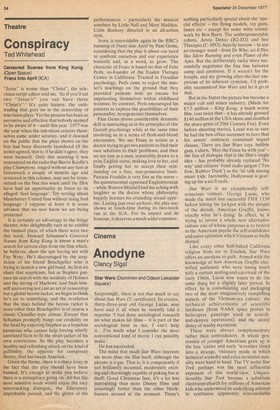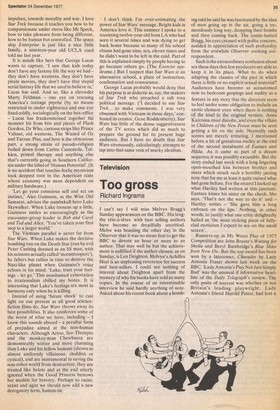Cinema
Anodyne
Clancy Sigal
Star Wars (Dominion and Odeon Leicester Square) Surprisingly, there is not that much to say about Star Wars (U certificate), Its creator, • thirty-three-year old George Lucas, may have said it all when he recently told a reporter 'I had done sociological research on what makes hit films — it is part of the sociological bent in me; I can't help it, . .1've made what I consider the most conventional kind of movie I can possibly make.'
He has succeeded.
The mind that made Star Wars interests me more than the film itself, although the picture is a gas. That is, it is competently if not brilliantly mounted, moderately exciting and charmingly capable of poking fun at itself. Good Christmas fare, it's a lot less patronising than most Disney films and toweringly better than the other blockbusters around at the moment. There's nothing particularly special about the 'special effects' — the flying models, ray guns, lasers etc — except for some witty soundwork by Ben Burtt. The anthropomorphic robots, Artoo Detoo (R2-D2) and See Threepio (C-3130), heavily borrow — to use no stronger word — from Dr Who, sci-fi flies like Silent Running and even Planet of the Apes. But the deliberately tacky story successfully negotiates the fine line between camp and corniness. If it weren't for the hoopla, and my growing after-the-fact suspicions of its inherent cynicism, I'd probably recommend Star Wars and let it go at that.
But in the States the picture has become a major cult and minor industry. (Made for $7.5 million — King Kong, a much worse film, cost twice that — it has already grossed $140 million in the USA alone and doubled, the share-price of 20th Century Fox). Even before shooting started, Lucas was so sure he had the box-office successor to Jaws that his actors' contracts contained sequel clauses. There are Star Wars toys, bubble gum, t-shirts. 'May the Force be with you' — the line of dialogue that is the film's single idea — has probably already replaced 'No way' and citizens' band radio jargon ('Ten four, Rubber Duck') as the 'in' talk among smart kids. Inevitably, Hollywood is gearing up for a sci-fi cycle.
Star Wars is an exceptionally selfconscious venture. George Lucas, who made the much less successful TUX' 1138 before hitting the jackpot with the sleeper of the decade, American Graffiti, knows exactly what he's doing. In effect, he is trying to invent a whole new alternative culture one of whose purposes is to restore to the American psyche the self-confidence and naive optimism which Vietnam so badly dented.
Like every other half-baked California religion from est to Essalen, Star Wars offers an anodyne to guilt. Armed with the knowledge of how American Graffiti electrified audiences who were losing touch with a certain mating-and-car-ritual of the early 1960s, Lucas now wants to do the same thing for a slightly later period. In effect, he is consolidating and packaging two of the most imaginatively compelling aspects of the Vietnam-era culture: the technical achievements of scientific hardware (from NASA space probes to 'helicopter gunships used in searchand-destroy operations), and the ascendancy of mushy mysticism. These were always complementary rather than contradictory. A whole generation of younger Americans grew up in the late 'sixties and early 'seventies tuned into a Strange, visionary mode in which technical wizardry and extra-terrestial mor ality went hand in hand. The TV series Star Trek perhaps was the most influential exponent of this world-view, Unques tionably Star Trek became a substitute classroom-church for millions of American kids who understood its underlying attempt to synthesise apparently irreconcilable impulses, towards morality and war. I love Star Trek because it teaches you how to be compassionate under stress like Mr Spock, how to take pleasure from being different, how to be human but controlled. The space ship Enterprise is just like a nice little family, a nineteen-year old UCLA coed told me last year.
It is minds like hers that George Lucas wants to capture. 'I saw that kids today don't have any fantasy life the way we had — they don't have westerns, they don't have pirate movies, they don't have that stupid serial fantasy life that we used to believe in,' Lucas has said. And so, like a shrewder Marty Feldman — one eye on rescuing America's teenage psyche (by no means restricted to under eighteens) and one eye fixed coldly, sociologically on the box-office — Lucas has frankensteined together his monster hit from bits and pieces of Flash Gordon, Dr Who, cartoon strips like Prince Valiant, old westerns, The Wizard of Oz and Tarzan. Plus, and here is the obnoxious part, a strong strain of pseudo-religion boiled down from Carlos Casteneda, Tolkien, primal therapy and anything else that's currently going in Southern California under the label of 'Human Potential'. (It is no accident that touchie-feelie mysticism took deepest root in the American state whose economy was most dependent on military hardware.) 'Let go your conscious self and act on instinct,' Alec Guinness, as the Wise Old Samurai, advises the numbskull hero Luke Skywalker. When Luke loosens up a little, Guinness smiles as encouragingly as the encounter-group leader in Bob and Carol and Ted and Alice, 'You've taken your first step to a larger world.'
The Vietnam parallel is never far from Star Wars. When Luke makes the decisive bombing run on the Death Star (run by evil Peter Cushing dressed as an SS man, with his minions actually called ‘stormtroopers'), he falters but rallies in time to destroy the Nazi-like planet when Guinness's voice echoes in his mind: 'Luke, trust your feelings — let go.' This unashamed exhortation to irrationalism chilled my bones. It is interesting that Luke's feelings are most in harmony only when he is killing.
Instead of using 'future shock' to cast light on our present as all good sciencefiction films do, Star Wars throws away its best possibilities. It also reinforces some of the worst of what we have, including — I know, this sounds absurd — a peculiar form of prejudice aimed at the non-human characters. Although Artoo, See-Threepio and the monkey-man Chewbacca are demonstrably 'wittier and more charming than Luke and his fellow humans (shown as almost uniformly villainous, cloddish or cynical), and are instrumental in saving the non-robot world from destruction, they are treated like helots and at the end utterly ignored when the Good Princess bestows her medals for bravery. Perhaps to racist, sexist and agist we should now add a new derogatory term, human-ist. I don't think I'm over-estimating the power of Star Wars' message. Bright kids in America love it. This summer I spoke to a touristing twelve-year old from LA who had seen it several times and was dying to get back home because so many of his school chums had gone nine, ten, eleven times and he didn't want to be left in the cold. Part of this is explained simply by people having to go because others go. (The Exorcist syndrome.) But I suspect that Star Wars is an alternative school, a place of instruction, confirmation and reassurance.
George Lucas probably would deny that his purpose is as didactic as, say, the makers of Star Trek who preached a sub rose political message. ('1 decided to use Star Trek.. .to make comments. 1 was very obsessed with Vietnam in those days,' confessed its creator, Gene Roddenberry). Star Wars has little of the dense suggestiveness of the TV series which did so much to prepare the ground for its present huge audience. But I have no doubt that Star Wars strenuously, calculatingly attempts to tap into that same vein of murky idealism.











































 Previous page
Previous page